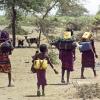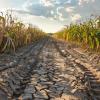
The reciprocal relationships between human populations and the environment becomes increasingly important in the light of climate change. Researchers from IIASA and Wittgenstein Centre published the Fact Sheet Climate Change and Demography, providing information for policy makers and scientists about some key areas where demography can contribute to climate research.
Human populations are at the center of climate change research. On the one hand, human activities contribute to climate change. On the other hand, changes in the climate system affect human wellbeing and livelihoods. Both the contribution to and the impact of global warming is not distributed equally across the planet. Rather, different people in different places contribute and suffer to different degrees, depending on their characteristics and their level of affluence. Climate risks are the outcome of differential exposure and vulnerability to hazards. Understanding the reciprocal relationships between human populations and climate change and how they will evolve in the future, thus, is crucial for policy design and planning, in the areas of both mitigation and adaptation.
News

05 March 2025
Project UPSTArt: Understanding Perceptions on Sustainability Transitions - from empirical research to participative Art-based approaches

05 March 2025
Co-creating a stakeholder-oriented climate risk service in Austria

25 February 2025

